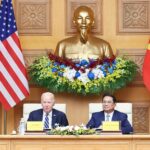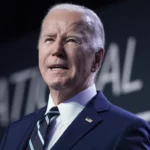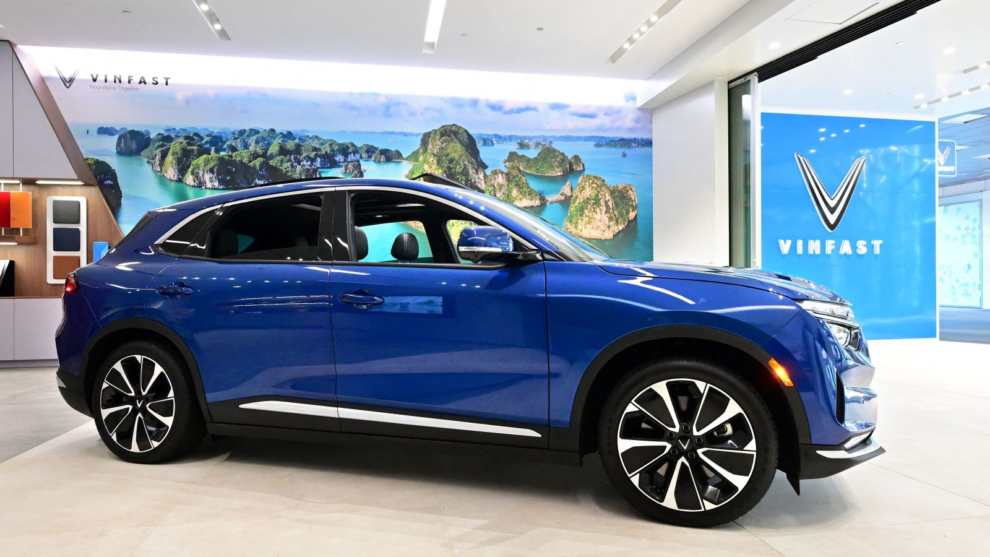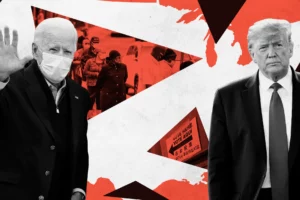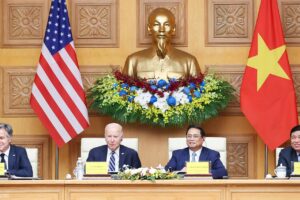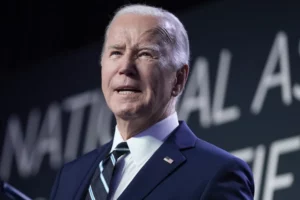On a cloudless day at the end of July, the Vietnamese electric-vehicle manufacturer VinFast broke ground on its first overseas manufacturing plant in Chatham County, North Carolina. Nine executives and political leaders thrust gold-painted shovels into the ground at once, including state governor Roy Cooper and VinFast CEO Le Thi Thu Thuy. “Today’s event marks a new milestone for VinFast,” said Thuy, “affirming our commitment to the North American market.”
The scale of the project is stunning for both VinFast and North Carolina. Once complete, the $4 billion plant would be the first auto factory in the state, and one of the biggest economic development initiatives in its history. VinFast plans to produce more than 150,000 vehicles here annually once construction is completed in 2025, creating 7,500 local jobs over the next decade. If the plan works, it will be a lucrative entry into the United States market for electric vehicles, boosted by a new $7,500 tax creditfor EVs that are assembled within U.S. borders.
Making the factory successful will require local educators to train an entirely new workforce in North Carolina. But the educators told Rest of World there’s a tangible cultural divide, suggesting that VinFast needs to adapt to U.S. worker habits. Similar projects like TSMC’s ongoing Arizona factory have already been hampered by a labor culture clash. With debt mounting and quality control issues looming, VinFast will have far less room to maneuver.
Much of the training will take place through partnerships with the Central Carolina Community College (CCCC), a two-year college with a campus in Chatham County and an enrollment of just over 5,000. With existing programs in electrical and industrial systems, CCCC is constructing an entirely new manufacturing facility for the purpose.
Erin Blakely, customized training project manager for VinFast at CCCC, told Rest of World the company has been responsive so far. “VinFast is very aware that business is different in North Carolina from Vietnam,” Blakely said. “To be successful, they know they need to adapt to the U.S. way of doing things.”
Blakely has met almost daily with VinFast human resources officials to hash out competitive wages and benefits packages for future employees, while also devising a proper training program for the incoming workforce. She said VinFast intends to hire the “vast majority” of its employees from within North Carolina and adjacent states. Future workers will likely need skills in understanding industrial systems, automation, or other advanced manufacturing experience.
VinFast is also working with local universities and colleges “to build a curriculum in STEM to stay ahead of the trend, help future generations easily access science and technology, find well-paying transportation-related jobs,” Nguyen Thi Van Anh, CEO of VinFast’s U.S. manufacturing, told Rest of World.
VinFast has been “actively engaging” with workforce boards to recruit employees for its facility, Margaret Roberton, vice president of workforce development at CCCC, told Rest of World. Roberton said she hopes to see a direct pathway system created within the neighboring public school systems to aid in recruitment efforts.
High-quality training in North Carolina is particularly important because of the quality control issues that have already plagued VinFast’s launch. Early drivers in Vietnam reported software and battery errors that were common enough to warrant every car owner keeping a 10-millimeter wrench on hand to reset the 12v battery. By the time VinFast cars reached U.S. users earlier this year, the reviews were even more brutal, despite the company having delayed delivery to fix the errors reported in Vietnam. In March, three top U.S. executives resigned in the same week, adding to the chaos. Two months later, VinFast recalled all 999 VF 8 cars it had exported to the U.S. over a software error. So far, the company has shipped fewer than 3000 EVs to the U.S.
That makes the U.S. factory a huge risk. “It’s like, [you] take step number three before you even took step number one,” Martin Schröder, an associate professor at Ritsumeikan University in Japan who studies the automotive industry, told Rest of World. “It requires so much investment. For a new company, it’s a really big challenge to raise so much money.”
Local officials have offered plenty of incentives to make the move. North Carolina has provided VinFast with a $1.2 billion package for the EV plant, including $38 million for job training from the local community college. The company could get up to $316 million in reimbursement from the state over three decades if it meets hiring goals.
“Bringing in a company like this really puts us in a position to bring in other kinds of jobs,” Rep. Robert Reives II, a Democrat representing Chatham County in the state assembly, told Rest of World. “Seventy-five hundred jobs is the flashy number, but it’s really about all the other economic impact around it that this brings, too.”
Reives believes in VinFast’s ability to be successful in his home county. Eventually, he said, everyone in Chatham County will reap the economic benefits. VinFast has “weathered a lot of forces to get where they are today,” and has the necessary funding to take some monetary hits early in the process, he said.
Judging by its fundraising, VinFast appears willing to spend vast sums of money to ensure the factory’s success. In October, the company entered into an agreement with a U.S. investment firm that will let it raise up to $1 billion in cash in exchange for company equity. In April, Vingroup chairman Pham Nhat Vuong pledged an additional $2.5 billion to the company.
VinFast’s factory also sits at the center of a growing labor fight within the U.S. After striking a deal with the Big Three auto manufacturers in November, the United Auto Workers (UAW) union has set its sights on unionizing future EV workers across the country, launching a massive organizing drive targeting auto factories in the southern U.S. “Workers at Tesla, Toyota, Honda, and others are not the enemy — they’re the UAW members of the future,” Shawn Fain, the union’s president, said in a speech last month.
When VinFast announced it was coming to North Carolina in March 2022, then-UAW president Ray Curry told the media the organization planned to unionize the facility. But VinFast’s leadership has downplayed the possibility of unionizing the plant. “It is too early for VinFast to discuss union participation at this stage,” said Van Anh. “Our plant will have appropriate and competitive human resource policies.”
Preliminary figures suggest the company will pay workers roughly $51,000 per year, which is $15,000 less than what UAW workers make at the Big Three companies.
The union has some presence in the state, with members at nine local manufacturing plants. But none of those operations are in the Triangle region of North Carolina, where VinFast is building its factory, and the plant’s location presents a significant challenge to organizers. North Carolina maintains a “right-to-work” law that greatly limits a labor union’s powers. The law has been in effect in the state since 1947, and only 2.8% of the state’s workers belong to a union, according to the U.S. Bureau of Labor Statistics.
“In the southern part of the country, it’s very hard for unions to organize,” Michael Walden, an economist at the North Carolina State University, told Rest of World. “That’s why, in the auto manufacturing business sector, you’ve seen new factories being built in places like Tennessee, South Carolina, North Carolina.”
Source: Rest of World


